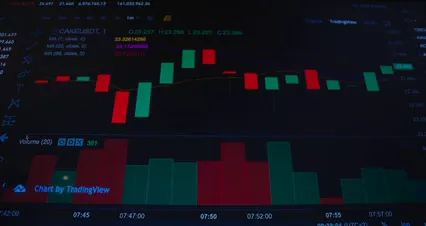
Why Stock Market Down Today: An In-Depth Analysis
Introduction
Stock markets can be unpredictable. They fluctuate daily based on various factors. Understanding why these declines happen is crucial for investors. Today, we’ll look into the current reasons affecting the stock market’s downward trend.
To navigate these turbulent waters, consider expanding your financial library. A great start is “The Intelligent Investor” by Benjamin Graham. This classic offers timeless wisdom on investing and can help you develop a robust investment strategy.
Summary and Overview
Currently, the stock market is experiencing notable declines across major indices. The S&P 500 dropped 0.3%, closing at 5,813.67. The Dow Jones Industrial Average fell by 0.2%, ending at 42,141.54. Meanwhile, the Nasdaq Composite decreased by 0.6% after reaching an all-time high earlier in the day.
Recent economic data shows mixed signals. The latest GDP reading indicated a growth of only 2.8%, falling short of the expected 3.1%. Additionally, major companies like Microsoft and Meta Platforms released disappointing earnings reports, further impacting investor sentiment. As analysts sift through these figures, market reactions remain cautious, leading to a bearish outlook for the near future.
For those looking to understand market fluctuations better, “A Random Walk Down Wall Street” by Burton Malkiel is a must-read. This book provides insights into market behavior and investment strategies that can help you stay ahead.
Current Market Status
Recent Market Performance
The stock market is facing notable declines today. The S&P 500 closed down 0.3%, landing at 5,813.67. The Dow Jones Industrial Average slipped 0.2%, finishing at 42,141.54. Meanwhile, the Nasdaq Composite fell by 0.6%, ending the day at 18,607.93.
These declines reflect significant market capitalization losses. Investors have seen approximately $1 trillion evaporate in recent trading sessions. Such fluctuations highlight ongoing concerns about stock market performance and index decline.
Key Drivers of Market Decline
Several factors are driving the current market downturn. Let’s break them down.
Economic Indicators
Recent economic data has not been promising. The latest GDP report showed growth at just 2.8%, below the expected 3.1%. Employment figures also paint a mixed picture, with job creation outpacing forecasts. These indicators contribute to market sentiment, leaving investors wary.
Earnings Reports
Disappointing earnings from major tech companies have further impacted the market. Microsoft and Meta Platforms reported lower-than-expected results. Microsoft shares fell nearly 4%, while Meta dropped 3% after missing user growth targets. Such earnings surprises create uncertainty, influencing investor decisions.
Geopolitical Factors
Geopolitical tensions are also affecting investor confidence. Ongoing international conflicts and trade issues create a volatile environment. Investors remain cautious, impacting market stability and contributing to negative sentiment.
These drivers highlight the complex interplay of economic indicators, corporate performance, and global events. Understanding these factors can help investors navigate current market challenges.
If you’re looking to bolster your investment strategy, consider “Common Stocks and Uncommon Profits” by Philip A. Fisher. This book teaches you how to analyze companies and select stocks that can outperform the market.
Expert Opinions and Predictions
Market Analyst Insights
Market analysts are closely observing today’s downturn. They highlight a mix of disappointing earnings and economic data as key factors. Jamie Cox, managing director at Harris Financial Group, stated, “Growth up, inflation down is precisely what you want to see.” This sentiment reflects cautious optimism regarding future market stability, despite current challenges. Many experts suggest that a prolonged correction could be in play, advising investors to remain vigilant while looking for buying opportunities.
As we navigate these fluctuations, keep an eye on upcoming earnings from major firms. These reports may provide clearer insights into the market’s potential direction. The stock market outlook appears uncertain, but seasoned analysts stress the importance of strategic positioning in light of evolving market conditions.
Additionally, if you’re seeking a straightforward guide to investing, “The Little Book of Common Sense Investing” by John C. Bogle is an excellent resource that emphasizes the importance of low-cost index funds and long-term investment strategies.
Historical Context
To understand today’s market, we can draw parallels with past downturns. Historically, markets often react similarly during economic slowdowns. For instance, the 2008 financial crisis saw significant declines due to rampant speculation and high debt. Data shows that during comparable downturns, markets typically experience corrections of 10-20%.
Today’s situation echoes that pattern. The S&P 500, down 0.3%, mirrors past performance during economic uncertainty. In similar instances, like the dot-com bubble burst, recovery took time but eventually led to robust growth. Observing these historical trends can help investors gauge current market behavior.
In conclusion, while the market faces challenges, lessons from history remind us that patience and strategic investments often yield positive results in the long run. To enhance your understanding of investing, consider reading “Rich Dad Poor Dad” by Robert Kiyosaki, which offers valuable insights into building wealth and financial independence.
Investor Sentiment
Current Investor Behavior
Investor sentiment is shifting as market conditions evolve. Many are feeling anxious amidst declining stock prices. Recent reports indicate a notable trend: investors are pulling out of riskier assets. The latest data shows that equity funds experienced withdrawals totaling $32 billion last month. In contrast, bond funds saw inflows of $5 billion, reflecting a cautious approach. This shift in behavior highlights the impact of market psychology on buying and selling trends. As uncertainty grows, investors are gravitating towards safer investments.
To further understand the psychology of investing, consider reading “Thinking, Fast and Slow” by Daniel Kahneman. This book delves into how we think and make decisions, which is crucial for investors navigating volatile markets.
Long-Term vs Short-Term Perspectives
The strategies of long-term investors differ significantly from those of day traders during downturns. Long-term investors typically remain focused on fundamentals, viewing dips as buying opportunities. They often hold onto their investments, believing in eventual recovery. On the other hand, day traders may react quickly to market fluctuations. Many are employing short-selling strategies or setting stop-loss orders to limit losses. This divergence in approaches highlights the importance of an investment strategy tailored to individual risk tolerance and market outlook. As the market continues to fluctuate, understanding these perspectives can help investors navigate their choices more effectively.
For those interested in honing their trading skills, “Market Wizards” by Jack D. Schwager is an excellent resource that shares insights from successful traders and their strategies.
Conclusion
Today’s stock market decline stems from several significant factors. Disappointing earnings from tech giants like Microsoft and Meta have shaken investor confidence. Additionally, mixed economic indicators, including a slower-than-expected GDP growth rate, are contributing to the bearish sentiment. Geopolitical tensions further complicate the landscape, leaving many investors cautious.
It’s crucial to remain informed and strategic during these turbulent times. Staying updated on market trends and economic signals is essential for making sound investment decisions. Remember, maintaining a long-term perspective can help you navigate the inevitable ups and downs of the market. Don’t let short-term volatility derail your financial goals.
If you’re looking to optimize your personal finance knowledge, consider “The Total Money Makeover” by Dave Ramsey. This book provides practical advice on budgeting, saving, and investing wisely.
FAQs
What are the main reasons the stock market is down today?
Key factors include disappointing earnings from major companies, mixed economic indicators, and geopolitical tensions that negatively impact investor confidence.
How do earnings reports impact stock prices?
Earnings reports directly influence market sentiment. Positive results can boost stock prices, while disappointing outcomes often lead to declines.
Should I sell my stocks during a market downturn?
Long-term investors should consider fundamentals and may choose to hold their investments. Short-term traders might react quickly to minimize losses.
What are some historical examples of significant market declines?
Notable declines include the 2008 financial crisis, the dot-com bubble burst, and the market crash caused by the COVID-19 pandemic.
How can I protect my investments during a downturn?
Diversification is key. Consider spreading investments across various sectors and asset classes to mitigate risks.
What are the implications of a stock market decline for the economy?
A stock market decline can reduce consumer spending and corporate growth, potentially leading to broader economic slowdowns.
How can investors interpret market volatility?
Investors should focus on long-term trends and avoid panic selling. Understanding market cycles can help navigate fluctuations effectively.
Please let us know what you think about our content by leaving a comment down below!
Thank you for reading till here 🙂
To gain a deeper understanding of the current market trends, you can explore more about why the stock market is going down today.















All images from Pexels




